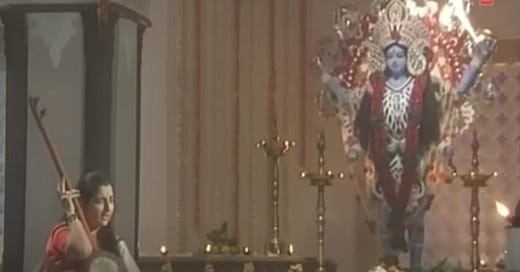
Shyama Sangeet is a genre of Bengali devotional poetry focused on the Goddess Kali. As I understand, it emerged in the 18th century with the writings of poet-saints like Ramprasad Sen (c. 1723-1775), who wrote the song that I will be translating here. Several poets have contributed to Shyama Sangeet since then, including Kamalakanta Bhattacharya (1772–1821) and Kazi Nazrul Islam (1899-1976).
Recently, I have been listening to and translating some Shyama songs, both out of a sense of nostalgia (my parents used to play them in the house and car) and a desire to better understand the Bengali literary tradition. I have been pleasantly surprised by the grammatical simplicity of the language used, but still need to look up several words.
Below, I have written up a translation of Sokoli tomari iccha, a popular song by Ramprasad Sen. One can find many renditions of it through a quick YouTube search, for example this one by Pannalal Bhattacharya.
I am trying a new translation scheme: original Bengali, Roman transliteration, and English translation. The translations are mostly literal, although I have taken some care to choose English words that I feel sound appropriate given the context, and English phrases that best convey certain grammatical features of the original (for example, relative-correlative pronoun pairs). As for the transliterations, I have made a compromise between different schemes. The main issue is that in Bengali, the divergence between spelling and pronunciation is quite drastic, especially when compared to Sanskrit (by design, no divergence) and Hindi (moderate divergence). I might write a post on this topic sometime in the future. Ultimately, I wanted to transliterate in a way that generally approximates the actual pronunciation. For readers who have no familiarity with the Bengali language, I highly recommend listening to audio clips first before reading the transliteration. I’m also using the transliteration to attach hyperlinks to words that I looked up in Samsad Bengali-English Dictionary by Sailendra Biswas, which has been conveniently digitized online here (note: the transliteration scheme used by the dictionary is different than what I use here).
সকলি তোমারি ইচ্ছা sokoli tōmāri icchā Everything is your will, ইচ্ছাময়ী তারা তুমি icchāmoyī tārā tumi You are the willful liberator, তোমার কর্ম তুমি করো মা tōmār kormo tumi korō mā You do your action, লোকে বলে করি আমি lōke bole kori āmi People say that they do it themselves সকলি তোমারি ইচ্ছা sokoli tōmāri icchā Everything is by your will. --- পঙ্কে বদ্ধ কর করী poñke boddho koro korī You hold down the elephant in the marsh, পঙ্গুরে লঙ্ঘাও গিরি poñgure loñghāō giri You help the crippled scale the mountain, কারে দাও মা ব্রহ্মা পদ kāre dāo mā brohmā podo On some, Ma, you bestow Brahman-hood কারে করো অধগামি kāre kōro odhogāmi Others, you send below, সকলি তোমারি ইচ্ছা sokoli tōmāri icchā Everything is your will. --- আমি যন্ত্র তুমি যন্ত্রী āmi jontro tumi jontrī I am the instrument, you are the operator, আমি ঘর তুমি ঘরনী āmi ghor tumi ghoronī I am the house, you are the dweller, আমি রথ তুমি রথী āmi rotho tumi rothī I am the chariot, you are the charioteer, যেমন চালাও তেমনি চলি jemon cālāō temoni coli I move the way you drive me, সকলি তোমারি ইচ্ছা sokoli tōmāri icchā Everything is your will.



